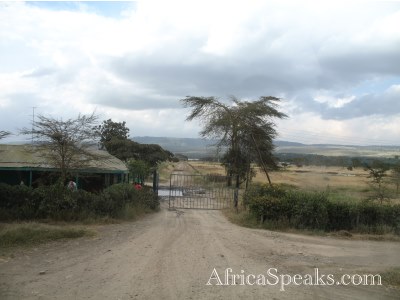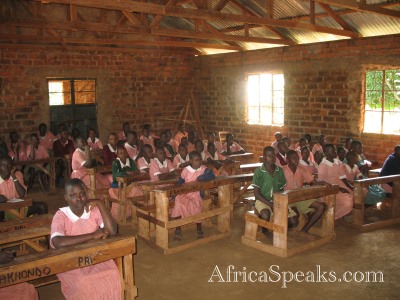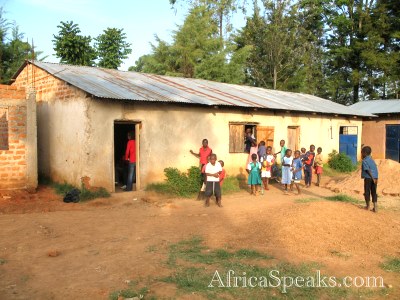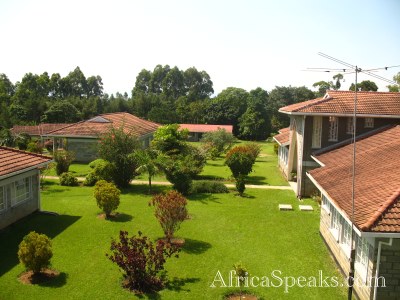The original URL of this article is:
www.africaspeaks.com/kenya/20082006.html
Of Land and Injustice: The Colonial Legacy in Kenya
by Ras Tyehimba
August 20, 2006
UWI Students Trip to Kenya
"When the Missionaries arrived, the Africans had the Land and the Missionaries had the Bible. They taught how to pray with our eyes closed. When we opened them, they had the land and we had the Bible".
– Jomo Kenyatta
 | | | Ras Tyehimba | |
The British entered the Kenyan region in the late 19th century wresting control from Omani Arab slave traders, who themselves had wrested control from the Portuguese invaders. The British were interested in controlling the rich resources of neighbouring Uganda and, to this end, Kenya was of particular strategic importance. They built a railway between Mombassa (on Kenya's east coast) and Kampala using labourers from India, many of whom remained and have become today's dominant merchant class. With the imperial might of the British Empire behind them, British settlers seized huge tracts of land from the indigenous people and set up plantations geared toward export crops such as coffee. Africans were displaced from their land, forced into reservations or on to inferior lands. Resistance, such as that by the Nnandi people, was stifled by British soldiers wielding superior weaponry. The British favoured some tribes and this divide and rule strategy set the foundation for future jealousy and ethnic conflict.
Like in many other countries in Africa, ownership of resources including prime land remained in the hands of European settler families even after Independence. Settlers were given 999 year leases for their huge tracts of stolen land. An estimated 80% of Kenyans depend on agricultural activities to sustain themselves and limited access to land, that was disingenuously taken away from them, has disgruntled many ordinary Kenyans. Timothy Gachangain in an article titled, 'Kenya: The Land is Ours' writes:
In an interview with a local TV station this year during the Madaraka (Independence) celebrations, ex-Mau Mau veterans were still expressing disappointment over Kenyatta's declaration that no land was free. Kenyans had to work for it. "This was a humiliating betrayal for Mau Mau. After spending years in the forest and risking our lives, we thought Kenyatta would recognize our sacrifice by rewarding us with land grants," complained an ex-Mau Mau veteran. They expressed disappointment over the absurdity of having to pay for "land that was rightly theirs". Understandably, the majority of landless people were unable to raise even the basic sum needed as a down payment for the purchase of "their land". They had no option other than to let go of the land which they regarded as their mother or the umbilical cord through which their spiritual and mental contentment was realized. It is this spiritual attachment to the land that made the Mau Mau sacrifice their lives and take arms to topple British colonialism.
 | | Entrance to the Delamere estate |
The month long stay in Kenya offered a first-hand look at the land situation. While we were traveling from Bungoma to Nairobi, we passed a massive spread of land owned by the British settler family, the Delameres. Their land stretched for miles and miles and miles. On it is a massive farm and cattle area, a shopping mall, an industrial complex and a large worker quarters. The Delamere family has a history of brutality towards Kenyans. We heard of a case that was reported in the media of a Delamere family member, Thomas Cholmondeley, shooting a Kenyan in cold blood, and this was not the first time that he had done such a thing. There is the perception that he escaped the previous murder charge because of the influence of his family.
Apart from the fact that prime land is concentrated in the control of British settler families, huge tracts of land are also under the control of multi-national corporations, Christian missionary organisations and a few local Kenyans who benefited from their government connections or positions after Independence.
The ownership of land is directly connected to the economic hardships experienced by many Kenyans and the lack of opportunities for development. Industries such as the profitable Tea and Horticultural industries are not owned or controlled by local Kenyans and thus the revenue accrued do not benefit the lives of ordinary Kenyans. A local Kenyan even described the working situation of the many Kenyans, who provide the labour for these industries, as enslavement.
 | | Children in Shiakhondo Primary School |
The digital divide is a stark reality here. Not many people have land telephones, but cell phones are very popular and the green and red advertising billboards of the two cell phones companies, Safari.com and Celltel, are everywhere. Computers and internet access are available from Internet cafes situated in town areas. None of the primary schools or secondary we visited had computers or internet access; there were other more pressing infrastructural issues to be dealt with. The infrastructure in most of the schools that we visited were inadequate. Rickety furniture and dilapidated buildings are some of the educational challenges faced by Kenyans, added to the fact that education is not free. In the rural area where we mostly stayed, most children go to school bare feet. In spite of the material poverty, the children we interacted with were enthusiastic and full of life. Visiting various schools and interacting with students and teachers was one of the highpoints of the Kenya experience.
In the villages, the traditional value system is most alive. For instance, Harambee, which signifies the spirit of working together, manifests in the operations of many self-help groups, a couple of which we visited. These groups have been very helpful to ordinary Kenyans overcoming everyday challenges, especially the general lack of material resources. The Harambee groups provide materials and labour to help build schools, healthcare centers, churches, drill bore holes for water and lobby for various other developmental needs of the community. Groups also generate revenue by planting crops, rearing livestock, beekeeping, and basketry. The Harambee concept embodies the ideas of assistance, co-operation, mutual self-responsibility and community self-reliance.
For me, the Kenya trip was a mixture of joy and pain. Joy at the beauty, warmth and enthusiasm of the people, yet pain for the suffering and lack of opportunities available. Kenya has suffered immensely from colonial rule; a legacy that continues today in a socio-economic system is which, although the political leadership is in the hands of indigenous Kenyans, control of resources has remained in the foreigners to the detriment of the indigenous population. To make matters worse, the Black Kenyan elite, who emerged in the Post Independence period, have followed in the footsteps of the colonial elite, making use of their government positions or connections to gain control of large tracts of land, with little benefit for ordinary Kenyans besides the receipt of meager wages in exchange for their labour.
 | | Lunao Primary School |
It was emotionally difficult for some members of our group to observe the extent of Westernization and Americanization present in Kenya, but the same forces of imperialism that has negatively affected the Caribbean and the rest of the world has also negatively affected Africa, perhaps with even more devastating consequences. Walter Rodney's, 'How Europe Underdeveloped Africa', provides a good starting point for understanding these realities of the Kenya people. Rodney links the present state of Africa to the economic prerogatives of European colonial nations who, in the process of expropriating resources from Africa, disrupted traditional institutions and the social organisation of indigenous peoples. Thus, the historical processes of colonialism and capitalism that allowed Europe and the United States to amass great physical and technological resources has also been accompanied by great suffering in so-called Third World regions from which labour and natural resources have been extracted.
The Kenya experience has a lot of lessons to draw upon: both Trinidad and Tobago and Kenya are caught in a vicious cycle of underdevelopment and 'misdevelopment', but in T&T, material comforts may blind many to the mechanisms of underdevelopment and thus from the solutions to the many social problems. Both countries have yet to address the historical underpinnings of their social, economic, educational and political systems, and as such 'progress' and 'development' have been moulded according to the values, biases and socio-economic priorities of both the local and foreign elite. The solutions to problems and the pathway forward cannot come from the same framework and attitudes that created the problems. Interestingly, Walter Rodney makes the point that solutions to problems are implicit in a correct historical evaluation.
Overall, the Kenya trip was an overwhelming success: it was a moving experience to interact with ordinary Kenyans, sharing aspects of our Caribbean reality while learning about Kenya and the Kenyan people. The Kenyan people were eager to learn about us and we shared aspects of our culture with them, including calypso and pan. The single tenor pan that we took and played in various places was a big hit, especially in the schools.
 | | Bishop Stam Pastoral and Animation Centre |
The experience raised many questions and discussions around issues that are generally taken for granted, thus providing an opportunity to work on the mental conditioning that locks persons, mentally and physically, in debilitating relationships with Europe and America. Furthermore, the experience highlighted the importance of history in understanding Africa and by extension ourselves, for the same pattern of foreign domination that has negatively affected the Caribbean is also a reality in Africa. Preference for foreign ideals and products is as much of an issue in Kenya as it is in Trinidad and Tobago. Colourism, the preference for lighter-skinned persons, is also a serious issue in Kenya, as the many advertisements for skin lightening creams showed. A local article titled the 'Color Divide' in one of the daily Kenyan papers attempted to address this issue.
Addressing the stigma and distortions around the African continent and her peoples through re-examining African history and by building genuine connections with the African continent can go a long way in Caribbean people evolving towards healthier self-concepts and developing proper solutions to the rampant ills brought about by western styled 'misdevelopment'.
UWI Students Trip to Kenya in pictures:
http://rastafarispeaks.com/gallery/Trip_to_Africa_2006
|
|